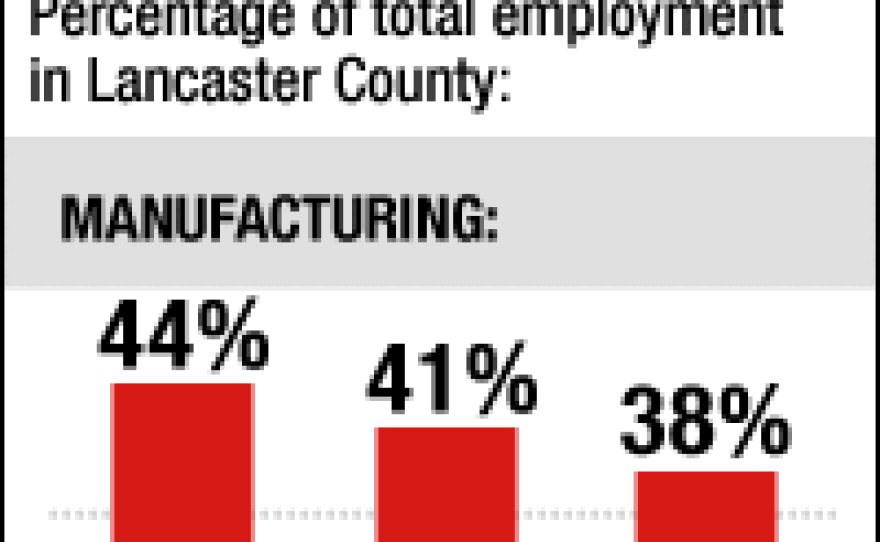


Donnie Ingram will be out of work around the end of this month. He has been laid off by the South Carolina company that he served for more than 30 years. He is spending the final days walking the floors of the massive textile mill — places like the sewing room and an area called the bleachery.
The machines inside are being moved to Brazil, he says.
The same company will run the same equipment using South Americans who work for less.
Many former employees of the company known as Springs Global will vote in their state's presidential primary. Republicans face the voters on Saturday, and Democrats on Jan. 26.
The voting happens amid spreading anxiety about the economy. So we've been listening to stories of how those laid-off employees are adapting to the loss of their community's largest employer.
"At one time, this was the largest fabricating and finishing facility under one roof in the world," says Angie Hunter, who met us in front of the red-brick complex in Lancaster County, S.C. "Fitted sheets, flat sheets or pillow cases — they would pack it, ship it out and it would leave all over the world."
Hunter is among thousands who lost their jobs after Springs merged with a Brazilian firm. Now this is just a distribution center for sheets and other products made elsewhere.
But Hunter is working again in this building. She got a job in the state unemployment office that took over some of the vacant space.
"It took me 11 months to get a job," Hunter says. "Whenever I left here, I knew I wanted a state job. [The] state never lays off."
Hunter is frank about the chances of the unemployed Springs workers who come here. They may have to live with a much longer commute, or much lower wages — or both.
Just across the border in North Carolina, some former Springs textile workers have found jobs at Tyson Foods. They carpool back to Lancaster, S.C.
One is actually earning more than in the job she lost. Another, Sam Blamour, is paid less. To help make up the difference, this native Liberian takes all the overtime he can get.
Blamour also accepted Tyson's offer to help pay for college classes. He's hoping he won't always have to return to his family's rental house at 2:30 a.m. after work.
Mike Montgomery, a former Springs textile mill supervisor, put his house up for sale and is attending a seminary. He's studying to become a missionary or a minister.
Getting Creative
Former Springs workers who still need to make a living say they need to get creative.
Consider Ingram, whose final job at Springs is helping to dismantle machinery to ship overseas. He leaves work this month at age 52.
"It's hard to find a good job at that age because you're at the age where you're too old [to be hired] but you're still not young enough to do what [employers] want you to do...." Ingram says. "It's just a bad spot to be in."
Last November, Ingram agreed to play host to a visiting presidential candidate.
John Edwards met a group of Springs workers in Ingram's home, and the Democratic candidate mentioned Ingram in a debate last week.
Yet, like many of the former workers we met, Ingram has not decided how to vote in South Carolina's upcoming presidential primaries.
He's more occupied with paying for his daughter's wedding, and securing his own future.
Ingram expects he'll never again make the income he once did.
He's thinking of throwing his severance pay into expanding a side business he's been sharing with his wife. They hope to make money recording videos of church events, weddings and birthday parties. Ingram is hoping other people's new beginnings will also become his. But he knows that other Springs workers have had trouble starting over.
Sandra Geiger, a former Springs worker, met us at Lancaster's unemployment office. She reports there every Monday to put in for another unemployment check.
"Everybody says ... 'You know, a year from now, it'll be great. You won't even think about it.' But it's been a year and it's still not any better than it was...." Geiger says.
'Nothing Compares with Losing a Job'
Her mother, Carolyn Summers, was also laid off from the textile mill.
"I lost my job on a Wednesday and they told me that my last day would actually be Friday," Summers says.
"That's probably the hardest thing I have ever gone through," she adds. "I went through a marriage and a divorce, lost my father at an early age. I lost my mother in '99. But nothing compares with losing a job that's your livelihood, and ... especially at my age, not knowing what you're going to do."
Summers says she found the answer on the wooden porch of her daughter's mobile home. They hired someone to build a deck, "and I thought, I could do that, but I needed to learn how."
Which she's doing now. An unemployment training law provided money for community college.
At age 63, Summers is studying to be a carpenter. She's been helping to renovate her daughter's bathroom.
Geiger is trying to find a job.
"Mom was talking about being lost. Well, I think I'm still lost. I'm not as strong as her and I just... I don't know if I want to go to school. I don't know ... what I want to do, but I'll figure it out," Geiger says. "Like Mama said, we'll trust in God. And he's got something out there for me, and I think I'll get there."
Again and again, laid-off workers in Lancaster, S.C., told us they lean on their faith in this uncertain time. And when you drive outside town, past the Sherwood Baptist Church, you see a sign that seems to play off the textile industry that built this place.
This week's message reads, "When you reach the end of your rope, you'll find the hem of His garment."
Copyright 2022 NPR. To see more, visit https://www.npr.org. 9(MDAzMjM2NDYzMDEyMzc1Njk5NjAxNzY3OQ001))






